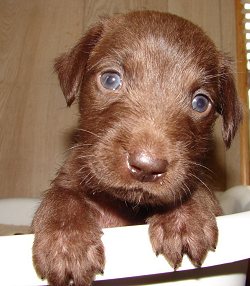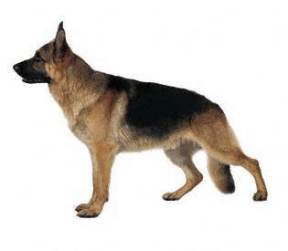Height: 22-26 inches
Weight: 65-95 lbs.
Life Span: 11-13 yrs.
Breed Group: Guardian Dogs
Overview
Well-bred and properly trained German shepherds are friendly, easygoing,
playful, and eager to please.
Because of their intelligence, responsiveness, and ability to focus, they
are a joy to train. German shepherds are adaptable to city, apartment, suburban,
and country living, as long as they are exercised and properly socialized
when young.
They are protective and will not retreat if their families or property are
threatened. A well-bred and socialized shepherd can easily become a child's
best friend, playing for hours and also protecting him.
German shepherds may be wary of strangers. Obedience training must begin
early.
Appearance
The German shepherd has a double coat of medium length. The outercoat is
dense, harsh, and straight, and lies close to the body; the undercoat is
woolly and dense.
Coat color is usually black and tan or solid black. White dogs exist, but
some breed registries do not admit them; others allow them as long as the
skin pigment on the nose, eye rims, and lip folds is black.
The hair on the tail is profuse. The erect, high-set ears give the impression
of alertness. The chest is deep, the thighs are muscular, and the rear legs
are usually flexed. The tail is carried low when the dog is relaxed.
Grooming & Exercise Needs
The German shepherd sheds year-round and should be brushed daily. A rake
and comb are handy during the heavy shedding season.
The German shepherd needs long walks and playtime every day to avoid boredom
and prevent behavioral and medical problems.
Origins
The German shepherd originated in the 19th century as a sheepherding dog.
Today this breed is better known for its skills in search-and-rescue, police,
military, bomb-detection, tracking, and protection work.
These highly trainable animals are also outstanding family dogs. Because
of their popularity, however, they have been indiscriminately bred, and
many undesirable traits have entered the shepherd gene pool.
It is a great pleasure to own a good shepherd. The key is finding a reliable
breeder who actively breeds for temperament and health.
Special Alerts
It is especially important to obtain a German shepherd from a reputable
breeder; aggressive behavior can be a problem with poorly bred animals.
Breed-related health concerns include: hip and elbow dysplasia, intractable
diarrhea, bloat, panosteitis, pannus (an inflammation of the cornea that
may interfere with vision if untreated), von Willebrand's disease (a common
disorder that causes excessive bleeding during or after surgery).
Reference: AKC - American Kennel Club |

